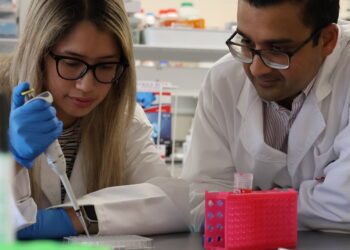“Only 20 per cent of our longevity and health in old age is genetically determined, the rest is up to us,” says Harvard genetics professor and author of Lifespan, Dr David Sinclair.
Genetics loads the gun, and the environment pulls the trigger. Your daily lifestyle choices and activities are either accelerating or slowing the brain ageing process. Just as you can train your muscles to retain a more youthful tone, you can use strategies to keep your brain functioning more optimally. Ultimately, brain ageing is optional according to New York Times best-selling author, psychiatrist, and brain disorder specialist, Dr. Daniel Amen.

Dr Rudy Tanzi, Ph.D.Professor of Neurology at Harvard Medical School in his studies on longevity and ageing, identifies the importance of protecting ourselves against inflammation. He claims that if you want to age well, especially in your brain, you have to do things in your life to stave off the effects of inflammation. It has been well studied that inflammation increases your risk of declining cognition and Alzheimer’s. Plan your lifestyle to limit inflammation in the body and brain which is plentiful sleep, the ability to manage stress, social interaction, exercise, learn new things, and diet.
Nutrition plays a vital role in brain function and ageing. What we eat nourishes our brains, and according to Lisa Mosconi, a neuroscientist and the author of Brain Food, of all the organs in our bodies, the brain is the most easily damaged by a poor diet. The nutrients we obtain from the foods we eat are taken up into the bloodstream and carried into our brains. Once there, they replenish depleted storage, activate cellular reactions, and become the very fabric of our brains. A brain-healthy diet optimises brain fitness over the course of a lifetime, while reducing the risk of developing age-related cognitive impairments and dementia.
Diets with the lowest amounts of omega-3s relative to other fats are associated with the highest rates of brain shrinkage over time and the highest risk of Alzheimer’s. Diets with the highest amounts of omega-3s are associated with the healthiest, most “youthful” brains.
Dr. Sara Gottfried, the author of Younger, believes in working on the following areas to upgrade the 90 per cent lifestyle influence which contributes to our ageing.
The Brain Factor
Your neurons (nerve cells) lose speed and flexibility as you age. Free radicals induce damage to cells, DNA, and proteins in a process called oxidative stress if you do not have antioxidant countermeasures in place (like vitamins A, C, and E). Your hippocampus (the part of your brain involved in memory creation and emotional control) may shrink, especially if you are stressed. On top of that, excess stress kills brain cells by increasing production of beta-amyloid, which puts the brain at risk for Alzheimer’s disease.
It is important to adopt a lifestyle that protects you from the ravages of ageing. By eliminating the following you can also benefit.
Poor Sleep
There is a wash that runs through your brain at night while you sleep, that removes damaging and toxic molecules associated with neurodegeneration, basically the decay of your brain. When you do not get enough sleep, you do not get the full detox from your glymphatic system which can lead to fatigue and cognitive issues.
Lack of Stimulation
When you stop engaging in cognitively stimulating activities like learning new and challenging things, studying, reading or current events, your brain can become cognitively stagnant. Challenging yourself mentally can help reverse mild to moderate symptoms of Alzheimer’s.
Lack of Community
Stronger social ties are proven to lower blood pressure and boost longevity and have more of a positive impact on your health. Having no social ties is an independent risk factor for cognitive decline. Talking to another person just ten minutes per day improves memory and test scores.
Diet and Microbiome
Take your health and diet seriously. Try a daily 12-16 hour fast to help your brain clear out debris – if dinner is at 7pm, breakfast should be no earlier than 7am.When your gut microbes and their DNA are out of balance, you may crave sugary foods in order to feed the troublemaking microbes, thereby inducing a vicious cycle of more cravings and more bad microbes. Problems with the microbiome are associated with cognitive decline anxiety, and depression.
The Longevity Factor
Five cultures in the world are famous for the longest-living residents. They have certain habits in common that switch on the right genes and switch off the wrong genes when it comes to ageing, which results in people living twelve years longer on average than the rest of the world. They all live on the coast or in the mountains. They eat fish. They consume fresh food in season. They dine on a particular superfood that is rich in antioxidants, such as seaweed in Okinawa, Japan, where women live the longest, or olive oil and red wine in Sardinia, Italy, where men live the longest. These cultures arrived at a particular combination of genes and lifestyle which support longevity and healthy ageing which we too can learn from and practice.




















